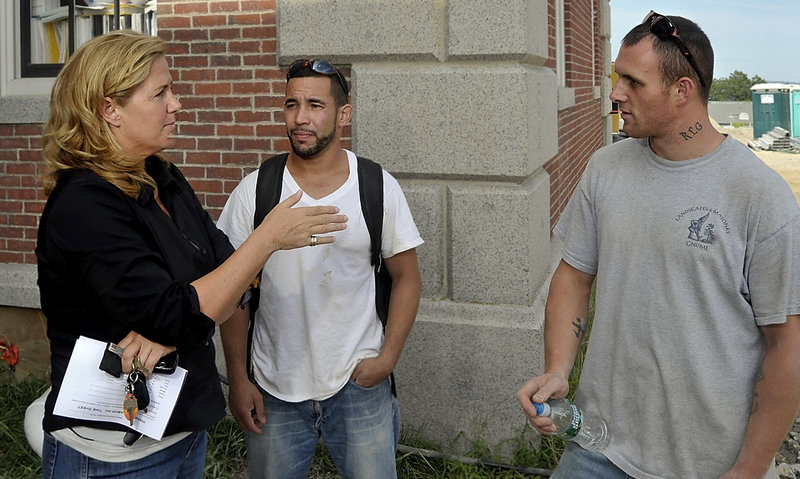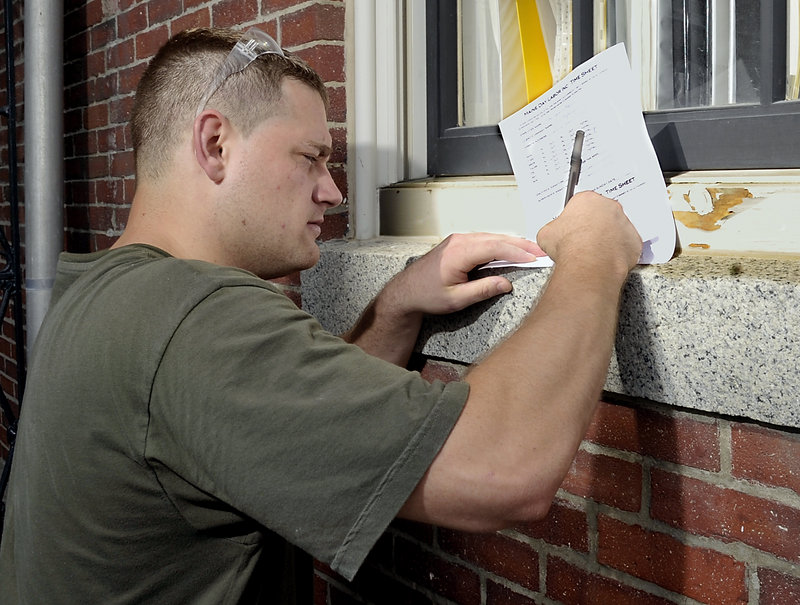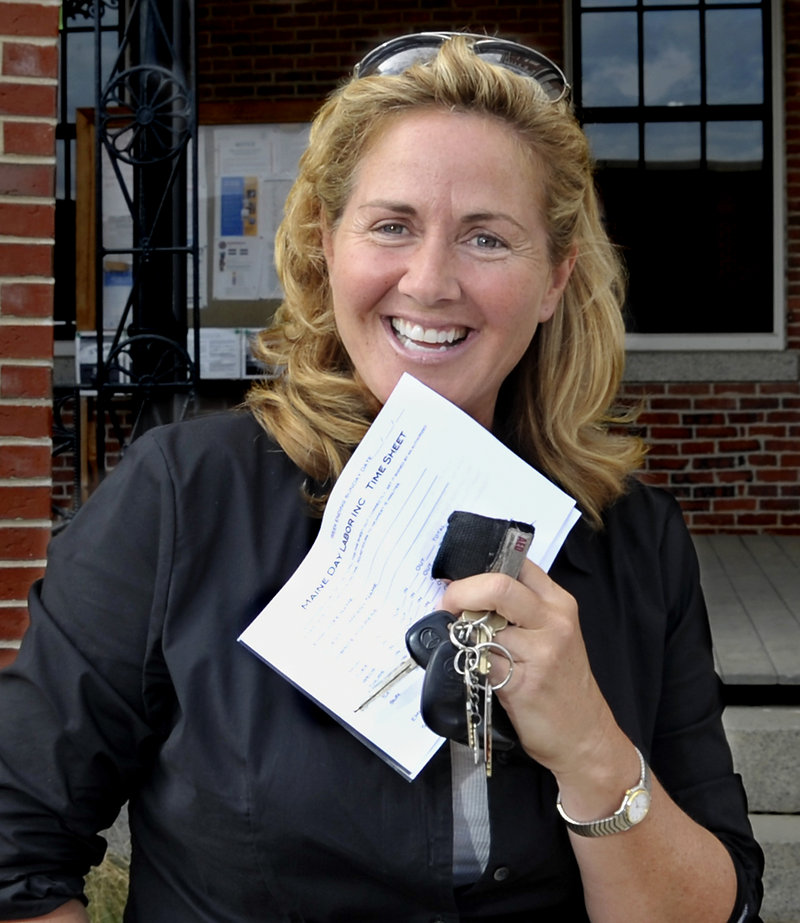When Travis Battis got out of prison in December, virtually every prospective employer shied away from his criminal history. He’d served two years for burglary and assault, he said.
But the 29-year-old fisherman landed a position with Maine Day Labor Inc., a Portland agency that hires temporary workers, including men who are getting out of jail or prison and need a chance to get their feet on the ground.
“I felt like it was a red flag everywhere else,” Battis said of his record. He tried fishing jobs, oil-change businesses and various other types of labor, without success. “It’s a weight lifted, to not have the stress of denial.”
Margo Davies, a self-described Falmouth lacrosse mom, helped start the agency after hearing the noted defense lawyer F. Lee Bailey give a presentation about the importance and the cost savings to society when businesses step up and hire felons.
“These guys who are committed to reform deserve opportunities,” said Davies, whose background includes human resources work for Wall Street investment companies.
For the working poor, getting by on two or three days’ pay isn’t easy, but it can mean the difference between an apartment or a homeless shelter, groceries or welfare.
The work experience and reference can be the step up an ex-convict needs to get established in the job market — one of the most important factors in staying out of trouble, say corrections officials.
“Employment is one of the key points of reducing long-term costs of the department, by reducing recidivism,” said Scott Burnheimer, superintendent of the Maine Correctional Center in Windham.
When Bailey addressed the Portland Community Chamber in June, he urged business leaders to make room in their work force for felons.
Bailey is trying to start an early-release program that provides job skills, and links prisons and jails with employers. Absent that, prison inmates face isolation and dismal prospects.
For many of those people, the consequences of incarceration last much longer than the sentence. They often leave prison with just a change of clothes — no money, no home and no job.
Many have lost their driver’s licenses. They typically have outstanding fines, restitution or child support they need to pay. They often must pay for substance abuse counseling or domestic violence counseling as part of their probation.
And unless they had an employer when they were sentenced that will hire them back, they face a hostile job market, made worse by the economic slowdown.
“Every application asks ‘Are you a felon?’” Davies said.
Davies and a partner, Sandy MacLeod, started Maine Day Labor in March. Some of its workers are students who want summer work, military personnel who are waiting to deploy, and others who lack full-time jobs.
Davies also works to recruit former inmates who are low-risk and will make the most of their opportunity.
On a recent day, she had 10 men working, six of whom were felons. Of those, four were on probation and two were still incarcerated but were eligible for work-release.
She wakes at 4:30 a.m. and starts fielding calls from clients who are looking for workers. The clients — mostly construction and landscaping companies — pay $18 an hour per worker.
She pays them $10 an hour, better than the $7.50 minimum wage. The rest covers the cost of doing payroll, taxes, worker’s compensation insurance and running the business. There is no health insurance for the part-time work.
Because few of the workers have licenses and even fewer have cars, Davies uses her minivan to pick up several of them in the morning and take them to work. At the end of the day, she drops them off at home, or at a pre-release center, halfway house or shelter.
In between, she said, she knocks on construction site trailers, trying to persuade foremen to take on a couple more short-term workers.
She recruits and screens potential workers, consulting probation, law enforcement and corrections officials to make sure the candidates are responsible and eager to work. “My clients trust me to make that character judgment,” she said.
Kristin Stevens runs a program at the Maine Correctional Center that allows prisoners to earn “Work Ready” certificates when their sentences are nearing their end.
The program entails 60 hours of training in such areas as demonstrating responsibility, problem solving, honesty and interview skills.
“For every job — the guy who picks up shingles on a job site — the owner says, ‘I’ve got 50 other people who are applying for this job, why should I take that guy with a rap sheet when I have 49 others that don’t?’” Stevens said.
Her response: “You’re essentially saving the state $65,000 a year,” the cost of imprisoning someone.
“My goal here is to put these men in long-term, sustainable jobs that pay a livable wage. That temporary work is a first step, something to make money right off the bat, something to get yourself ready right when you leave,” Stevens said.
Davies participated in Stevens’ program, conducting mock interviews, and in the process landed a worker, Kyle Crooker, who hadn’t yet been released.
Davies said workers fresh from prison have advantages.
They are on probation, so substance abuse isn’t a problem, she said. And they are hungry for work.
“They hit the ground and run really hard,” she said.
This spring, one of her former workers, a woodsman from northern Maine, painted the hull of a boat in half the time it took two of the marina’s employees to do the same job on another boat, the client told her.
“They’re all ‘prison jacked’– pumped up because they all lift weights in jail,” she said.
Davies’ interest in starting the business stems from her work helping people who are marginalized. She has volunteered at the Milestone shelter in Portland, for people who have alcohol abuse problems. She helped develop substance abuse programming at the Cumberland County Jail.
Her workers — whom she calls “my guys” — appreciate her efforts.
“She sees the best in all of us and we try to do what we can to not disappoint her,” said Battis.
Davies also encourages them to do the right things outside of work, like attending counseling, he said.
Leonardo Tavares, 30, was released recently after serving 10 months. He has been able to work for the past four months as part of his work-release program.
The $3,500 he earned allowed him to pay off his fines and pay first and last month’s rent on an apartment.
He’s still trying to land a permanent job, but his vocation — offshore lobstering — conflicts with his probation because it could take him into international waters, he said.
Davies said she hopes the temporary work leads to permanent jobs, and it has for some workers who have been able to demonstrate their reliability.
She hopes more of the state’s major businesses will sign on.
Davies said her business plays just one small part in trying to address the wider issue of helping people get back on track after they’ve broken the law.
“I believe every significant employer in the state, if they have any sense of responsibility, should be filling jobs that are unfilled,” Davies said. “For any company where there are people at the top making more than $500,000 a year, they should do their best for guys who need to get by.”
Staff Writer David Hench can be contacted at 791-6327 or at:
dhench@pressherald.com
Send questions/comments to the editors.





Success. Please wait for the page to reload. If the page does not reload within 5 seconds, please refresh the page.
Enter your email and password to access comments.
Hi, to comment on stories you must . This profile is in addition to your subscription and website login.
Already have a commenting profile? .
Invalid username/password.
Please check your email to confirm and complete your registration.
Only subscribers are eligible to post comments. Please subscribe or login first for digital access. Here’s why.
Use the form below to reset your password. When you've submitted your account email, we will send an email with a reset code.